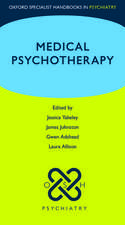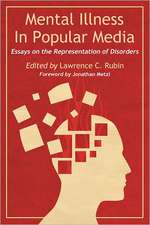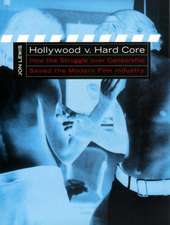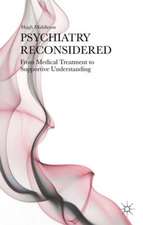Prozac on the Couch – Prescribing Gender in the Era of Wonder Drugs
Autor Jonathan Metzlen Limba Engleză Paperback – 19 apr 2005
"Prozac on the Couch "locates the origins of psychiatry's "biological revolution" not in the Valiumania of the 1970s but in American popular culture of the 1950s. It was in the 1950s, Metzl points out, that traditional psychoanalysis had the most sway over the American imagination. As the number of Miltown prescriptions soared (reaching 35 million, or nearly one per second, in 1957), advertisements featuring uncertain brides and unfaithful wives miraculously cured by the "new" psychiatric medicines filled popular magazines. Metzl writes without nostalgia for the bygone days of Freudian psychoanalysis and without contempt for psychotropic drugs, which he himself regularly prescribes to his patients. What he urges is an increased self-awareness within the psychiatric community of the ways that Freudian ideas about gender are entangled in Prozac and each new generation of wonder drugs. He encourages, too, an understanding of how ideas about psychotropic medications have suffused popular culture and profoundly altered the relationship between doctors and patients.
Preț: 213.58 lei
Nou
Puncte Express: 320
Preț estimativ în valută:
40.87€ • 42.58$ • 33.98£
40.87€ • 42.58$ • 33.98£
Carte tipărită la comandă
Livrare economică 11-25 februarie 25
Preluare comenzi: 021 569.72.76
Specificații
ISBN-13: 9780822335245
ISBN-10: 0822335247
Pagini: 296
Ilustrații: 34 illustrations
Dimensiuni: 156 x 234 x 27 mm
Greutate: 0.5 kg
Editura: MD – Duke University Press
Locul publicării:United States
ISBN-10: 0822335247
Pagini: 296
Ilustrații: 34 illustrations
Dimensiuni: 156 x 234 x 27 mm
Greutate: 0.5 kg
Editura: MD – Duke University Press
Locul publicării:United States
Recenzii
"In offering an engrossing history of psychiatry over the past 50 years, [Jonathan Michael Metzl] seeks to show that there are indeed connections between Freud and Prozac." The Economist"Prozac on the Couch is a creative, intelligent, and provocative challenge to the notion that biologic psychiatry has replaced psychoanalysis as the dominant therapeutic model in psychiatry." Delese Wear, New England Journal of Medicine"Full of genuinely fascinating observations. . . . Prozac on the Couch is a thought-provoking and useful book.Lisa Jervis, BitchProzac on the Couch is a totally fresh and mind-altering work of medical history and cultural criticism that challenges us to think about psychiatric medications in ways that are both uncomfortable and inspiring: in other words, in ways that challenge us to change our points of view about what we swallow and why.Lauren Slater, author of Prozac Diary Prozac on the Couch . . . takes on biological psychiatrys master narrativewhich tells of the triumph of disinterested neuroscience over a range of gender-inflected pseudo-scientific therapeutic practicesand persuasively, with wit and elegance, deals it a devastating blow.Elizabeth Lunbeck, IsisJonathan Michel Metzls book is an original and insightful exploration of the lively cultural meanings he locates in the spaces between the person, the psychotropic drug, the physician, and the neuroscientist.Emily Martin, author of The Woman in the Body: A Cultural Analysis of ReproductionProzac on the Couch combines a bold thesis regarding the persistence of Freudian categories of sexual difference amid the paradigm shift in psychiatry, documentation spanning professional and popular discourses, and lively, clear prose.Mari Jo Buhle, author of Feminism and Its Discontents: A Century of Struggle with Psychoanalysis
"In offering an engrossing history of psychiatry over the past 50 years, [Jonathan Michael Metzl] seeks to show that there are indeed connections between Freud and Prozac." The Economist "Prozac on the Couch is a creative, intelligent, and provocative challenge to the notion that biologic psychiatry has replaced psychoanalysis as the dominant therapeutic model in psychiatry." Delese Wear, New England Journal of Medicine "Full of genuinely fascinating observations... Prozac on the Couch is a thought-provoking and useful book."--Lisa Jervis, Bitch "Prozac on the Couch is a totally fresh and mind-altering work of medical history and cultural criticism that challenges us to think about psychiatric medications in ways that are both uncomfortable and inspiring: in other words, in ways that challenge us to change our points of view about what we swallow and why."--Lauren Slater, author of Prozac Diary "Prozac on the Couch ... takes on biological psychiatry's master narrative--which tells of the triumph of disinterested neuroscience over a range of gender-inflected pseudo-scientific therapeutic practices--and persuasively, with wit and elegance, deals it a devastating blow."--Elizabeth Lunbeck, Isis "Jonathan Michel Metzl's book is an original and insightful exploration of the lively cultural meanings he locates in the spaces between the person, the psychotropic drug, the physician, and the neuroscientist."--Emily Martin, author of The Woman in the Body: A Cultural Analysis of Reproduction "Prozac on the Couch combines a bold thesis regarding the persistence of Freudian categories of sexual difference amid the paradigm shift in psychiatry, documentation spanning professional and popular discourses, and lively, clear prose."--Mari Jo Buhle, author of Feminism and Its Discontents: A Century of Struggle with Psychoanalysis
"In offering an engrossing history of psychiatry over the past 50 years, [Jonathan Michael Metzl] seeks to show that there are indeed connections between Freud and Prozac." The Economist "Prozac on the Couch is a creative, intelligent, and provocative challenge to the notion that biologic psychiatry has replaced psychoanalysis as the dominant therapeutic model in psychiatry." Delese Wear, New England Journal of Medicine "Full of genuinely fascinating observations... Prozac on the Couch is a thought-provoking and useful book."--Lisa Jervis, Bitch "Prozac on the Couch is a totally fresh and mind-altering work of medical history and cultural criticism that challenges us to think about psychiatric medications in ways that are both uncomfortable and inspiring: in other words, in ways that challenge us to change our points of view about what we swallow and why."--Lauren Slater, author of Prozac Diary "Prozac on the Couch ... takes on biological psychiatry's master narrative--which tells of the triumph of disinterested neuroscience over a range of gender-inflected pseudo-scientific therapeutic practices--and persuasively, with wit and elegance, deals it a devastating blow."--Elizabeth Lunbeck, Isis "Jonathan Michel Metzl's book is an original and insightful exploration of the lively cultural meanings he locates in the spaces between the person, the psychotropic drug, the physician, and the neuroscientist."--Emily Martin, author of The Woman in the Body: A Cultural Analysis of Reproduction "Prozac on the Couch combines a bold thesis regarding the persistence of Freudian categories of sexual difference amid the paradigm shift in psychiatry, documentation spanning professional and popular discourses, and lively, clear prose."--Mari Jo Buhle, author of Feminism and Its Discontents: A Century of Struggle with Psychoanalysis
Notă biografică
Jonathan Michel Metzl is Assistant Professor of Psychiatry and Women's Studies and Director of the Program in Culture, Health, and Medicine at the University of Michigan. In this capacity he works as a senior attending physician in the adult psychiatric clinics and teaches courses at the undergraduate and graduate levels. He has written for the American Journal of Psychiatry, the American Journal of Psychotherapy, Academic Medicine, Gender and History, and SIGNS: The Journal of Women, Culture, and Society. This is his first book.
Textul de pe ultima copertă
""Prozac on the Couch" combines a bold thesis regarding the persistence of Freudian categories of sexual difference amid the paradigm shift in psychiatry, documentation spanning professional and popular discourses, and lively, clear prose."--Mari Jo Buhle, author of "Feminism and Its Discontents: A Century of Struggle with Psychoanalysis"
Cuprins
List of Figures ix
Acknowledgments xi
List of Abbreviations xii
1. Introduction: The Freud of Prozac 1
2. The Name of the Father, the Place of the Medication: A Brief History of Psychiatry, 1955–2002 23
3. Anxiety, the Crisis of Psychoanalysis, and the Miltown Resolution, 1955–60 71
4. The Gendered Psychodynamics of Pharmaceutical Advertising, 1964–97 127
5. Prozac and the Pharmacokinetics of Narrative Form, 1994–2002 165
6. Conclusion 195
Notes 201
Bibliography 239
Index 259
Acknowledgments xi
List of Abbreviations xii
1. Introduction: The Freud of Prozac 1
2. The Name of the Father, the Place of the Medication: A Brief History of Psychiatry, 1955–2002 23
3. Anxiety, the Crisis of Psychoanalysis, and the Miltown Resolution, 1955–60 71
4. The Gendered Psychodynamics of Pharmaceutical Advertising, 1964–97 127
5. Prozac and the Pharmacokinetics of Narrative Form, 1994–2002 165
6. Conclusion 195
Notes 201
Bibliography 239
Index 259
Descriere
Paperback version of book published in spring 2003. Argues that the rise in psychiatric drug treatments was not a radical turn away from psychoanalysis, but instead carries on Freudian assumptions, especially in relation to gender.













